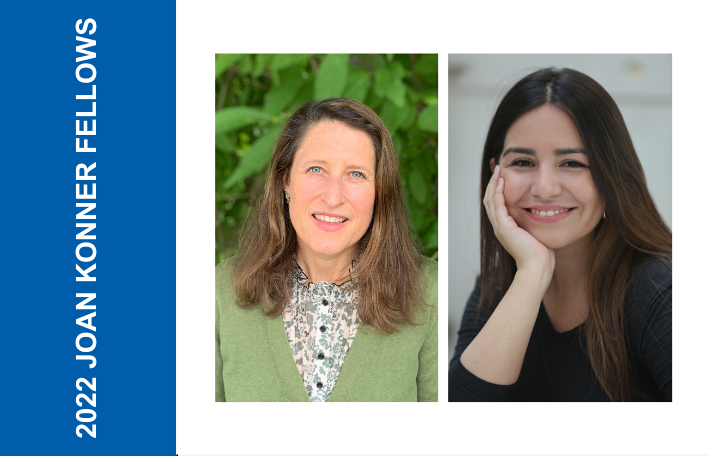The 2022 Fellows of the Joan Konner Program in the Journalism of Ideas are Named

Columbia Journalism School (CJS) is proud to announce the 2022 fellows in the Joan Konner Program in the Journalism of Ideas, which supports reporting or academic research that depart from traditional journalism beats to focus on ideas and beliefs. Established through a bequest from the estate of Joan Konner and with generous support from the M & T Weiner Foundation, the program honors the legacy of Joan Konner, dean emerita of the school and producer of groundbreaking broadcast programs that explored the most compelling ideas of her time and the cultural forces behind them.
Fellows receive $10,000 and faculty mentorship on work in any medium and on any subject exploring the intellectual foundations and significant questions arising from the world of ideas.
The fellowship is open to graduates of CJS master's programs from the last six years (Classes of 2017-2022) and PhD students who have completed their coursework. The program honors the late Joan Konner, dean emerita of the school and producer of groundbreaking broadcast programs that explored the most compelling ideas of her time. The new fellows are:
Julia Shipley, a 2020 MA-Arts and Culture graduate of Columbia Journalism School. Shipley received the school’s prize for the best MA thesis, which subsequently appeared in Grist and Rolling Stone. Previously, she was a regular contributor to Seven Days: Vermont’s Independent Weekly, Yankee Magazine and Harvard’s Nieman Storyboard, where she launched “The Pivot,” a column about navigating journalism-career disruptions. As a 2021-22 fellow in Columbia Journalism Investigations’ “Hidden Epidemics 2.0” project, Shipley contributed to climate-health audio and print projects in collaboration with NPR and the Texas Newsroom. With support from TYPE Investigations and the Fund for Investigative Journalism, Shipley was part of a team focused on a climate-housing report, which is due to be published by The Center for Public Integrity, Yahoo News and Mother Jones.
Muriel Alarcón Luco is a Chilean journalist working as a freelance reporter in Santiago, Chile. She studied at Pontificia Universidad Católica Journalism School and graduated with an MA-Science degree in 2020 from Columbia Journalism School. Alarcón teaches an advanced writing class at Pontificia and she works as a research assistant for Chile’s National Fund for Scientific and Technological Development, which studies the transformations of Chilean journalism as part of its World of Journalism Study. She is a regular contributor for El Mercurio and La Segunda, two of Chile’s major newspapers. In 2022, she reported on Latino communities in NYC as a grantee of the Pulitzer Center and Fundación Gabo, and she was a fellow for Columbia Journalism Investigations’ Global Migration Project. Her reporting on the working conditions of home health aids, published in The New York Times and supported by TYPE Investigations, won the Silurians Press Club's Medallion Award for Science & Health Reporting. Alarcón’s stories have also been published at New York Magazine's GrubStreet and Univisión.
Shipley and Alarcón’s project, “A Blouse in the Desert,” will center on the growing mountain of clothes in the Atacama Desert in Chile, where bundles of cast off and waste garments from other parts of the world are left to reside permanently in this landscape.
The two journalists will dive deep into the concept of the “death” of clothing, and explore the larger cultural forces behind it. This work is also an invitation to observe the clothing cycle, from its origin to its slow decomposition. They will talk to fashion designers, ecologists, land use experts, upcyclers, phenomenologists and anthropologists in order to discover how one of the world’s biggest repositories of unwanted clothing, a consequence of “fast fashion,” has come to be located here. By exploring the strange destiny and possible rebirth of a million blouses, they will reimagine how future generations will interact with waste and the possible opportunities within it.
Contact:
Elena Cabral
Assistant Dean of Academic Programs and Communications
[email protected]
212-854-1124